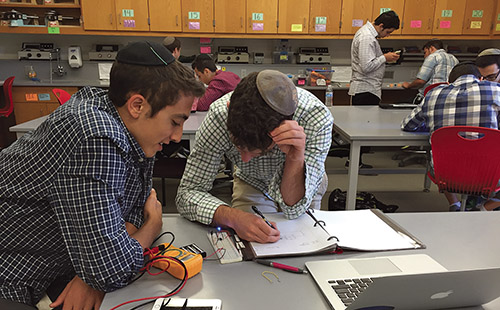

With the increasing importance of computer science and engineering, Yeshiva University High School for Boys (MTA) updated its educational programming to best equip its students for the rapidly changing workforce and the changing times. As Dr. Seth Taylor, principal of general studies explained, “STEM education needs to be part of any school curriculum since some familiarity with coding is becoming as important in the 21st century economy as reading and writing.” A recent grant from the Gruss foundation enabled MTA to upgrade its facilities and revamp curriculum to respond to this need.
Dr. Taylor, along with Head of School Rabbi Josh Kahn and others in the school leadership and science department, wished to create a program that granted every student a requisite background in these areas, while also allowing passionate students to explore the subjects more deeply. Consequently, Dr. Taylor explained that “MTA created a STEM program which provides each student with a foundation in coding and engineering in the sophomore year and allows interested students to develop a concentration in the field with Advanced Placement classes in programming and robotics in later grades.” Thus, the focus of the grant and new program lies in MTA’s exciting new sophomore curriculum.
Ms. Megan HLZacks, chair of the science department, has been heavily involved in organizing this exciting new course. She explained how the newly renovated classroom leads directly to a more engaging and captivating class experience. Using the recent grant, MTA upgraded the speakers, wiring, computers and projectors in this room. They also invested in physical materials for the course, including data simulation blocks and boat building supplies. These supplies allow students to perform hands-on engineering experiments, and learn about coding in an exciting and simple manner. Using the upgraded technological supplies, teachers can then explore these topics in depth and offer insightful feedback. David Tanner, a junior, commented that these elements truly enhance the STEM program, saying that he enjoys the “hands-on” nature of the classes. He elaborated, that “Under Ms. HLZacks’ guidance we get to play around and learn things on our own instead of just listening to a lecture.”
Recently, students used these materials and methods to learn about issues like buoyancy and construction, not simply through textbooks, but by building boats. The project mimicked a real-life engineering scenario, as students attempted to minimize costs while maximizing efficiencies. Subsequently, teachers utilized the new technological materials to examine video of these boats, encouraging students to discover how to improve these projects. These new supplies encourage interactive learning, and allow productive reflection about students’ successes and areas for improvement within these projects.
The new setup more effectively facilitated group learning between students. Instead of singular desks, the room contains group tables, allowing students to work collaboratively on these projects. This allowed students to learn from each other, and to develop important skills in working with classmates. Tanner, explained that “the program has helped me develop my teamwork skills and allowed me to be creative in a wonderful environment.”
Though the new curriculum is still fresh, students are already enjoying and gaining a great deal from these course. Dr. Taylor commented that “many of our students find these courses particularly interesting since, as opposed to a traditional teacher-centered structure, they are assigned to work on projects with other students which they conceive, design and build on their own under the supervision of a faculty mentor.” In the coming months, Dr. Taylor predicts that students will only continue to benefit and learn from this exciting new STEM curriculum.








